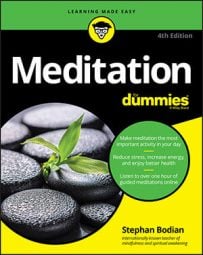The discipline discussed here is the kind of self-discipline that prompts top athletes like LeBron James and Novak Djokovic to get up every morning and run several miles and then practice their shot or their stroke over and over, long after they’ve gotten it right. It’s the kind of self-discipline that motivates great writers to sit at their computers each day, no matter how they feel, and pound out their copy.
The truth is, you already have self-discipline, though you may not be aware of it. You need self-discipline to get to your job on time or to orchestrate a schedule filled with business commitments, personal interests, and family responsibilities. You merely need to apply the same self-discipline to the practice of meditation.
Making a commitment to yourself — and keeping it
When you commit to marriage or some other monogamous relationship, you make an agreement with yourself and your partner to stay together through thick and thin, no matter what life brings. Without this commitment, you may be tempted to leave when your partner becomes angry or does something you can’t stand or when you find yourself withdrawing or “falling out of love.” Of course, you can always decide to end the relationship, but as long as you’re committed, you’re going to do all you can to maintain it.The same holds true for meditation. Commitment is the foundation for your meditation practice. Without commitment, you won’t keep meditating when you’re tired, have a headache, don’t feel like it, would rather do something else, or run up against some obstacles.
And what prompts you to make the commitment to meditate in the first place? You have to be motivated, which means you have to know how you can benefit from what meditation has to offer, and you must have strong personal reasons for continuing. These reasons may include a desire to alleviate personal suffering or stress, an aspiration to achieve greater focus and clarity, and a concern for the welfare of others.
The commitment process usually involves the following five distinct steps:
- Becoming motivated: Ouch, life hurts! I need to find out how to deal with my pain.
- Setting your intention: I know what will help! I’ll meditate for 30 minutes every day!
- Making an agreement with yourself: From now until the end of the month, I agree to get up at 7 a.m. and count my breaths before I go to work.
- Following through: Whew! I didn’t realize how hard it would be to sit still for so long, but I refuse to break my agreement with myself!
- Gaining momentum: Wow! The more I meditate, the easier it gets. I’m really beginning to enjoy it.
Being consistent, day after day
Take sports again. If you train for a day and then slack off for a week, you won’t make much progress. In fact, you may end up straining a muscle or hurting your back because you haven’t conditioned your body gradually, as most fitness gurus recommend.Likewise, when you practice meditation, you’re developing certain mental and emotional muscles like concentration, mindfulness (ongoing attention to whatever is arising, moment to moment), and receptive awareness. Here, too, consistency is the key. You need to keep it up and keep it regular, no matter how you’re feeling from day to day.
In fact, your feelings provide the fodder for your meditation practice as you expand your awareness from your breath to include the full range of your experience. You don’t have to be any special way — just show up and be yourself!
Restraining yourself, both on and off the cushion
Broadly speaking, self-restraint is the quality of mind that keeps you from acting on every impulse or desire that flits through your brain. It helps you discriminate between behavior that’s useful and supportive and behavior that’s unsupportive or even harmful. If you’re an athlete, you need self-restraint to prevent you from eating junk food or staying out late when you’re training for a big competition. If you’re a meditator, self-restraint can function on several different levels:- Before meditation: You may choose to eat well and in moderation or to avoid mind-altering substances, such as marijuana, alcohol, or too much caffeine, because you want to keep your mind clear and fresh for your meditation.
- During meditation: You can use self-restraint to keep pulling your mind back from its habitual fantasies and preoccupations to the object of your meditation, be it your breath or a mantra or some other focus. Be careful, however, not to confuse self-restraint with repression, avoidance, or judgment. You don’t need to criticize yourself for wandering off, nor do you want to push certain “undesirable” thoughts or feelings out of your mind. Instead, just welcome whatever arises, while gently returning your focus to the object of your meditation.
- After meditation: As your practice deepens and strengthens, you build a certain power or energy of mind. In the East, they call this power samadhi. You can blow off this energy by daydreaming or planning or obsessing, or you can use self-restraint to channel your energy back into your practice of being mindful from moment to moment.

